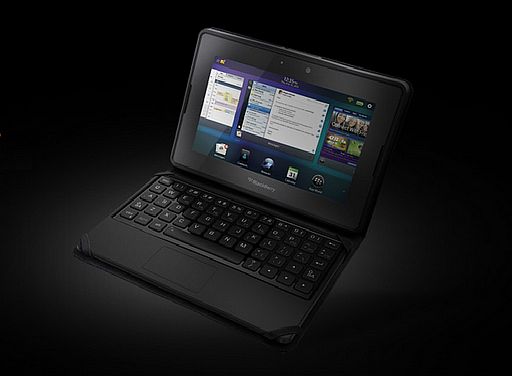Bluetooth Keyboard Added To PlayBook Accessories

In another attempt to spur interest in the BlackBerry PlayBook, RIM has launched a Bluetooth-supported mini keyboard and case
Research In Motion (RIM) has introduced a keyboard that connects to its PlayBook tablet via BlueTooth. Known as the BlackBerry Mini Keyboard, the $119 (£76) accessory includes 128-bit encryption and up to 30 days’ battery life on a single charge.
That announcement comes just as a new Federal Communications Commission document revealed a version of the PlayBook with either Evolved High-Speed Packet Access (HSPA+) or 4G Long-Term Evolution (LTE) support.
On the roadmap
“This version of the tablet has been tipped previously to be coming with an upgraded series of specs such as near-field communication (NFC) and a dual-core 1.5GHz processor under the hood,” noted Slashgear. “This device (or both versions of the device, rather), has been leaked previously via a RIM road map which noted the device to be scheduled for mid-2012.”
 RIM pushed out its long-awaited PlayBook software upgrade on 21 February. PlayBook OS 2.0 includes a number of features demanded by users ever since the seven-inch tablet made its debut in April 2011. These include built-in email, calendar and contacts; a variety of new apps; and social-networking integration with calendar and contacts.
RIM pushed out its long-awaited PlayBook software upgrade on 21 February. PlayBook OS 2.0 includes a number of features demanded by users ever since the seven-inch tablet made its debut in April 2011. These include built-in email, calendar and contacts; a variety of new apps; and social-networking integration with calendar and contacts.
The BlackBerry Bridge app, which lets users tether a BlackBerry smartphone to their PlayBook – the better to view things on the latter’s larger screen – had likewise been updated, with a BlackBerry able to act as a wireless keyboard and mouse for the PlayBook.
These advancements come despite anaemic sales for the PlayBook. In December, RIM announced it would take a $485 million (£310m) charge against its PlayBook inventory, or $360 million (£230m) after applicable taxes. In a 2 December statement, RIM cited “competitive dynamics of the market” and the delay of the PlayBook OS 2.0 upgrade as reasons behind the write-down.
Nonetheless, the PlayBook continues to play a vital role in RIM’s current strategy. The tablet’s operating system is based on QNX, which the Canadian device maker acquired in 2010. Later this year, in a bid to reassert its position within the smartphone market, RIM plans on releasing a line of so-called “super phones” running the QNX-based BlackBerry 10 operating system.
Seeking a sizable apps ecosystem for those BlackBerry 10 devices, RIM executives have been encouraging third-party developers to build apps for the PlayBook, with an eye toward porting those wares to the smartphone platform once it finally hits the market.
In the meantime, they almost certainly hope that a physical keyboard – along with some software tweaks – will increase consumer and business interest in the PlayBook.